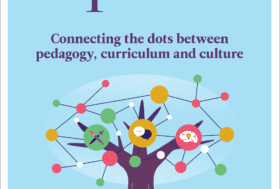Sara Baker, Professor of Developmental Psychology and Education, University of Cambridge, UK
In this video, Sara Baker discusses the role of play in early child development, including:
- how play enables learning
- myths about play and child development
- how agency is developed in early childhood.
You can read Sara’s article on this topic in Impact.
Play harnesses the way the brain learns naturally. It enables children to explore the world and discover.
Play is flexible. It allows children to adapt and adjust what they’re doing to learn through mistakes in a really kind of low-stakes environment. It’s also open-ended so they can explore, they can examine and investigate and find out the answers to their questions or just enjoy searching. Another really interesting thing about play, which mirrors the way children learn naturally, is that it’s inherently motivating. It comes from an internal curiosity.
Some people think about play as being on a continuum, from free play to guided play, for example. Another way of thinking about it is in terms of the activity that children are engaged in, so you could be observing children doing construction play with bricks, or they could be engaged in messy play, or they could be rough and tumble play.
So there’s many different types and when it comes to, for example, messy play, it might look like it’s just chaotic, and from the outside observer, the children are purely having lots of fun, and usually, they are having lots of fun. But there can also be lots of important skills that they’re developing in the process. So they might be having to practise cooperation and collaboration and sharing the materials or even planning ahead, so it might look messy, but there might be a goal that the children have in mind.
They might encounter obstacles and challenges along the way, which they have to resolve and think of other ways of getting there. So maybe they’re making handprints and what the handprints start to look like as the play develops is a tree, and then they could get the idea that they want to actually paint a tree. And so it can be actually very goal-directed even though the activity itself may be set out in a very open-ended way.
When it comes to learning about science and hands-on learning and learning through play, these are all really, really great opportunities for children to develop skills. And sometimes, I hear that educators are a little bit worried about getting too much into science because of what we might see as a really kind of heavy knowledge base. And if one doesn’t feel like an expert, for example, in the forces behind floating and sinking, then it can be quite intimidating to get involved in that and to open up those topics with children.
I would suggest that it’s possible to focus on the skills that children are developing, while they are, for example, messing around with floating and sinking. And that those skills, like perseveration, curiosity, problem-solving, all of those characteristics of learning will really stand children in good stead in the long run for their engagement with their learning, so rather than being really nervous about the forces, we could focus a bit more on supporting the children to engage in the learning activity.
A key myth that I sometimes hear is that there’s a right way to play and actually, play, quite on the contrary, is more of… I look at it more as a window into the skills and the experiences that children have. So rather than expecting to see children engaging with the world around them and with the people around them in a certain way, play gives us the opportunity to understand what that child is bringing to their learning. For example, what cultural experiences they have, what language they’re using, and how the language they’re using helps them to understand the world around them.
Agency is developed by giving children opportunities with an enabling environment and also with close relationships. So children can develop self-regulation, and that could be emotional regulation, that could be behavioural regulation, but also so that they develop that motivation and that love of learning. So it’s a combination of some cognitive skills, some emotional knowledge and skills, and also the support from the people around them. They can develop a real sense of being empowered and being the leaders of their own learning.






